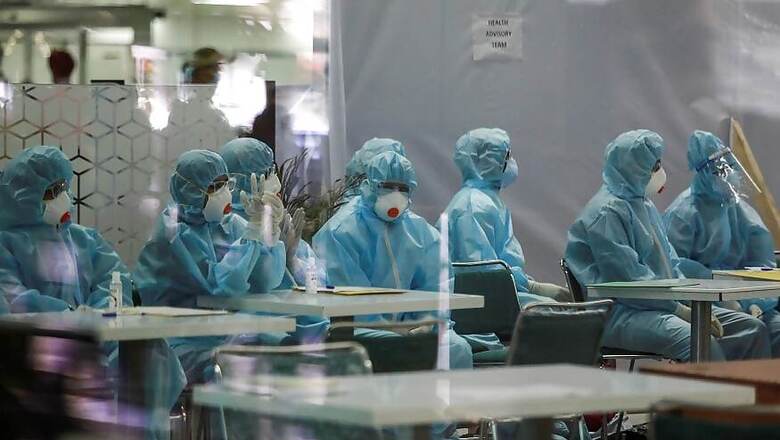
views
Patients who have recovered from Covid-19 may help in reducing the pandemic's infection rate as lockdown measures are eased to improve the economy in several parts of the world, a study says.
Researchers, including those from the Georgia Institute of Technology in the US, said the presumed immunity of those who have recovered from the novel coronavirus infection could allow them to safely substitute for susceptible people in certain high-contact occupations such as healthcare.
They anticipate that this "shield immunity," would protect against short-term reinfection and allow recovered patients to expand their interactions with infected and susceptible people.
According to the study, published in the journal Nature Medicine, this could potentially reduce overall transmission rates when interactions are permitted to expand.
The scientists suggested that an intervention strategy based on shield immunity could reduce the risk of allowing the higher levels of human interaction needed to support expanded economic activity.
They said the number of people infected by the novel coronavirus is likely much higher than what has been officially reported, adding that this could aid efforts to utilise the presumed immunity of recovered individuals to protect the larger community.
Noting an important caveat to this strategy, the scientists said, the duration of immunity to reinfection by SARS-CoV-2 remains unknown.
However, based on earlier studies they said individuals who survived infections by related viral infections, like SARS, had persistent antibodies for approximately two years, and those who survived infection to MERS had evidence of immunity for approximately three years.
Determining on a broad scale who has antibodies that may protect them from the novel coronavirus will require a level of reliable testing not yet available in many parts of the world, the scientists said.
"Our model describes ways in which serological tests used to identify individuals who have been infected by and recovered from COVID-19 could help both reduce future transmission and foster increased economic engagement," said Joshua Weitz, study co-author from the Georgia Institute of Technology.
"The idea is to think in advance about how identifying recovered individuals could help serve the collective good, using information collected on neutralising antibodies in new ways," Weitz said.
In the current study, the researchers studied the potential impacts of presumed immunity among recovered persons using a computational model of COVID-19 transmission dynamics.
In a population of 10 million citizens, for example, they said the model predicts that in a worst-case transmission scenario, implementation of an intermediate shielding strategy could help reduce deaths from 71,000 to 58,000.
An enhanced shielding plan, the study said, could cut deaths from 71,000 to 20,000.
Based on the model, the researchers also suggested that shielding could enhance the effects of social distancing strategies that may remain in place once higher levels of economic activity resume.
Identification of individuals who have protective antibodies against the novel coronavirus has begun only recently, the said.
Antibody tests are not 100 per cent specific, implying that tests can lead to false positives, the study cautioned.
However, targeted use of antibody testing in groups with elevated exposure will lead to increases in positive predictive value, even with imperfect tests, it said. According to the researchers, serological testing could identify recovered individuals among healthcare professionals who might then be able to interact with patients with reduced concern for infection.
Across society, the relatively small number of individuals with immunity could substitute for people whose immunity status isn't known.
Doing this may reduce transmission risk both for recovered individuals and those who remain immunologically naive, the scientists said.
"We want to think about serology as an intervention. Finding out who is immune to the coronavirus could make a big difference in trying to reduce the risk to people who would be vulnerable by interacting with someone who could pass on the disease," Weitz said.
"The reality is that people within high-contact jobs probably are likely to have a higher incidence of infection than other groups," he added.
But the scientists also caution that using antibody information about individuals may create privacy issues, and require those individuals to make informed decisions about accepting risks for the greater good of the community.
"What this model says is that if we could identify individuals who are immune, there is a chance that some individuals would not have to reduce their level of interaction with others because that interaction would be less risky," Weitz said.
"Rather than trying to keep reducing interactions, which is helpful for reducing transmission but bad for what it does for the economy, we might be able to maintain interactions while reducing the risk, combined with other mitigation approaches," he added.
Addressing the pandemic will ultimately require the development and mass production of a vaccine that could boost immunity levels beyond 60 percent in the general population.
Until this is available, Weitz believes that shield immunity could become part of the approach to the challenge.




















Comments
0 comment